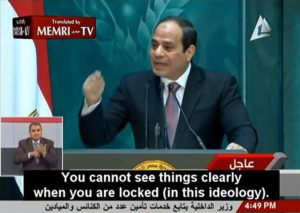by WorldTribune Staff, May 31, 2015 and Republished on April 26, 2017
After placing Egypt at the forefront of a “religious revolution” in a New Year’s speech, President Abdul Fatah Sisi has tasked clerics with combating radicalism in schools, mosques and the media.
“You, imams, are responsible before Allah. The entire world is waiting. The entire world is waiting for your next word because this nation is being torn apart,” Sisi said in his address at Cairo’s Al-Azhar, a 1,000-year-old Islamic learning center.

Scholars in the audience were said to have turned “white as sheets” when Sisi told them radicalization in Egypt had become “a source of anxiety, danger, killing and destruction for the rest of the world.”
The Al-Azhar institution is seen as a key in Sisi’s “religious revolution.” Built in the 10th century, it opened a university that spread Shi’ite Islam and later became a Sunni mosque and college that stressed the four schools of mainstream Sunni Islam.
Some students at Al-Azhar say they are deeply skeptical of the plans for more moderate teachings, calling the institution a mere mouthpiece of the state. Morsi-era professors have been sacked and the government has taken a major role in the institution’s appointment system. New rules state that students who engage in rioting, vandalism or join protests may be expelled.
Student critics said the government’s harsh crackdown is radicalizing people who may have been open to a message of moderation.
The reformation of Al-Azhar also includes modernization. It is using social media to slam Islamic State of Iraq and Levant (ISIL) attacks and it recently started a YouTube channel to refute Islamists propaganda and promote its own.
Sisi is also seen making inroads with the nation’s Coptic Christians, calling upon Egyptians to unite as “one hand, put aside sectarian divides and set an example for the rest of the world.”
“It is very important that the world sees us as Egyptians. And you have noticed that I never use any other word but the word Egyptians. It’s not acceptable for anyone to tell anyone else anything different. We are Egyptians. Nobody should say: What kind of Egyptian are you? … We are setting an example from right here in Egypt.”
Sisi, who led the military overthrow of Mohammed Morsi, is pushing a combination of security and education, promoting a more moderate version of the faith while denouncing radicalized thinking.
“That thinking — I am not saying ‘religion’ but ‘thinking’ — that corpus of texts and ideas that we have sacralized over the years, to the point that departing from them has become almost impossible, is antagonizing the entire world. It’s antagonizing the entire world,” the president said in his New Year’s address.
“Is it possible that 1.6-billion people [Muslims] should want to kill the rest of the world’s inhabitants — that is seven-billion — so that they themselves may live? Impossible! I am saying these words here at Al Azhar, before this assembly of scholars and ulema: Allah Almighty be witness to your truth on Judgment Day concerning that which I’m talking about now.
“All this that I am telling you, you cannot feel it if you remain trapped within this mindset. You need to step outside of yourselves to be able to observe it and reflect on it from a more enlightened perspective.
“I say and repeat again that we are in need of a religious revolution. You, imams, are responsible before Allah. The entire world, I say it again, the entire world is waiting for your next move … because this umma is being torn, it is being destroyed, it is being lost; and it is being lost by our own hands.”
Sisi has pledged the government would rebuild churches destroyed after Morsi was ousted. Copts say funding has been slow and they have relied mostly on donations.
Some say renovations have become easier, although a statute requiring presidential approval for all new churches remains.
